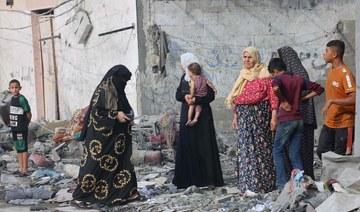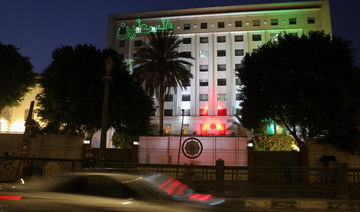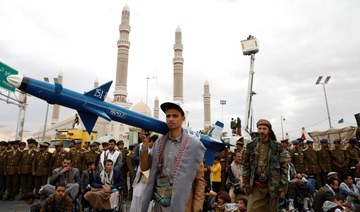MOSCOW/ANKARA: Russian President Vladimir Putin accused the US on Wednesday of inflaming the Middle East by sending an aircraft carrier group to the region, saying “compromise solutions” were needed and that he hoped common sense would prevail.
The Kremlin chief has called the explosion of violence between Israel and the Palestinians a vivid example of the failure of US policy in the Middle East, which he says has taken no account of the needs of the Palestinians.
Following the surprise attack by Hamas militants on Israel on Saturday, US Defense Secretary Lloyd Austin said the US was moving a carrier strike group, which includes the USS Gerald R. Ford, closer to Israel.
Putin, speaking at an energy conference in Moscow, said the US move, which was also fiercely criticized by Turkish President Recep Tayyip Erdogan on Tuesday, was a mistake.
“I don’t understand why the US is dragging aircraft carrier groups into the Mediterranean Sea. I don’t really understand the point. Are they going to bomb Lebanon or what?” he said.
“Or have they decided to try to scare someone? There are people there who are no longer afraid of anything. This is not the way to solve the problem. Compromise solutions need to be looked for. Of course, such actions are inflaming the situation.”
Erdogan said that Israel’s blockade and bombing of Gaza in retaliation for Hamas’ attack was a disproportionate response amounting to a “massacre.”
With Ankara offering to mediate, Erdogan and his foreign minister held calls with regional powers, the US and others. However, Israel’s envoy to Ankara has said it is too early to discuss mediation.
Speaking to his ruling AK Party in parliament, Erdogan said even war had a “morality” but the flare-up since the weekend had “very severely” violated that.
“Preventing people meeting their most fundamental needs and bombing housing where civilians live — in short, conducting a conflict using every sort of shameful method — is not a war, it’s a massacre,” he said, referring to Israel cutting off electricity and water to Gaza and destroying infrastructure.
Erdogan criticized Israel’s “disproportionate” attacks on Gaza as “devoid of any ethical foundation,” and called on the world not to “blindly” take one side. Leaving the underlying issue unresolved would lead to new, more violent conflicts, he warned.
“We call on countries in the Americas, Europe, and other regions to take up a position between the parties that is fair, just, and based on humanitarian balances. Everyone should refrain from acts that will wholly punish the Palestinian people, like blocking humanitarian aid,” he said.
Meanwhile, airstrikes smashed entire city blocks to rubble in the tiny coastal enclave and left unknown numbers of bodies beneath mounds of debris. The bombardment raged on even though militants are holding an estimated 150 people snatched from Israel — soldiers, men, women, children and older adults.
Israel has vowed unprecedented retaliation against the Hamas militant group ruling the Palestinian territory after its fighters stormed through the border fence on Saturday and gunned down hundreds of Israelis. Since then, militants have continued to fire rockets at Israel, including a heavy barrage at the southern town of Ashkelon on Wednesday.
After the attack, Israel stopped the entry of food, water, fuel and medicine into the territory — a 40-km-long strip of land wedged among Israel, Egypt and the Mediterranean Sea that is home to 2.3 million Palestinians. The sole remaining access from Egypt was shut down on Tuesday after airstrikes hit near the border crossing.
As Palestinians crowded into UN schools and a shrinking number of safe neighborhoods, humanitarian groups pleaded for the creation of corridors to get aid in, warning that hospitals overwhelmed with wounded people were running out of supplies.
“There is no safe place in Gaza right now,” journalist Hasan Jabar said after three Palestinian journalists were killed in the bombardment of a downtown neighborhood home to government ministries, media offices and hotels. “I am genuinely afraid for my life.”
The UN’s World Health Organization said that supplies it had pre-positioned for seven hospitals have already run out amid the flood of wounded. Doctors Without Borders said surgical equipment, antibiotics, fuel and other supplies were running out at two hospitals it runs in Gaza.
In one, “we consumed three weeks worth of emergency stock in three days, partly due to 50 patients coming in at once,” Matthias Kannes, the aid group’s head of mission in Gaza, said on Wednesday. He said the territory’s biggest hospital, Al-Shifa, only has enough fuel for three days.
Israel has mobilized 360,000 reservists and appears increasingly likely to launch a ground offensive into Gaza, with its government under intense public pressure to topple Hamas, which has ruled the territory since 2007 and remained firmly in control through four previous wars.
That would likely require a prolonged ground assault and reoccupying Gaza, at least temporarily. Even then, Hamas has a long history of operating as an underground insurgency in areas controlled by Israel.
“We will not allow a reality in which Israeli children are murdered,” Israeli Defense Minister Yoav Gallant said in a meeting with soldiers near the southern border on Tuesday. “I have removed every restriction — we will eliminate anyone who fights us, and use every measure at our disposal.”
Israeli airstrikes late on Tuesday struck the family house of Mohammed Deif, the shadowy leader of Hamas’ military wing, killing his father, brother and at least two other relatives in the southern town of Khan Younis, senior Hamas official Bassem Naim said.
Deif has never been seen in public and his whereabouts are unknown.
Exchanges of fire over Israel’s northern borders with militants in Lebanon and Syria, meanwhile, pointed to the risk of an expanded regional conflict.
On Wednesday, the Lebanese militant group Hezbollah fired anti-tank missiles at an Israeli military position and claimed to have killed and wounded troops.
The Israeli military confirmed the attack but did not comment on possible casualties. The Israeli army shelled the area in southern Lebanon where the attack was launched.
In a new tactic, Israel is warning civilians to evacuate whole neighborhoods — rather than just individual buildings — then inflicting devastation, in what could be a prelude to a ground offensive.
Hamas officials have said they planned for all possibilities, including punishing Israeli escalation. Desperation has grown among Palestinians, many of whom see nothing to lose under unending Israeli military occupation and increasing settlements in the West Bank, a 16-year-long blockade in Gaza and what they see as the world’s apathy.
The Hamas-run Interior Ministry said Israeli airstrikes destroyed the entire Al-Karama neighborhood in Gaza City, with a “large number” of people killed or wounded. It said medical teams were unable to reach the area because all roads to it were destroyed. Rescue officials say they have struggled to enter other areas as well.
On Wednesday, a reporter witnessed waves of rockets rain down on Ashkelon, with shrapnel slamming into the street and Israel’s Iron Dome missile defense system intercepting at least one overhead. Residents screamed and wept as they heard the explosions.
On Tuesday night, a group of militants entered an industrial zone in Ashkelon, sparking a gunbattle with Israeli troops, the military said. Three militants were killed, and troops were searching the area for others.
























